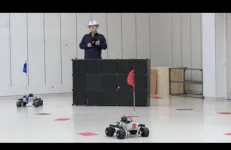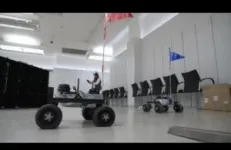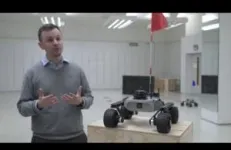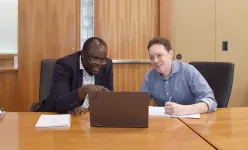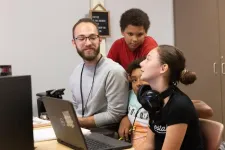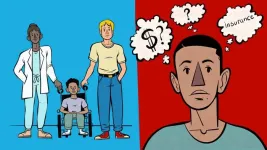(Press-News.org) Trust between humans and robots is improved when the movement between both is harmonised, researchers have discovered.
These findings could improve the success of real-world human-robot teams, helping users like the emergency services to work more effectively with robots in the future.
By sensing co-movement in real-world environments, robots could use this as an indicator to sense whether the user trusts them sufficiently.
Lead author Dr Edmund Hunt, based in the University of Bristol’s Faculty of Science and Engineering, said: “People have preferred social distances from others during interaction and their proximity shapes engagement.
“This is true for human-robot interaction as well. The way a robot moves can also convey information to a user – humans quickly perceive apparent goal-directed behaviour from robot motion.
“We wanted to understand whether how humans and mobile robots move together – co-movement through a space such as a building – can affect levels of trust in the robot.”
The team predicted that if robots can move alongside humans in a synchronised way it would build trust – and conversely, that if a user distrusts a robot, the co-movement will be disrupted.
The experiment took place in ‘Sparks Bristol’ where members of the public were teamed up with two mobile rover robots and asked them to imagine they were a firefighter searching a building after a fire, using the robots to inspect the building and make sure it was safe.
The team then tracked the human and robot movement using an ultrasound tracking system. They found statistical evidence that synchronisation between human and robot movement over time, when the robot was within two metres, is related to changes in self-reported trust. Users who reported lower trust in the robots were found to have mirrored the robots’ movements less.
This means movement could potentially be used by the robots as a marker for problems with their user’s trust in them, and they could take pre-emptive actions to try and improve or repair the trust, for instance if they have made a mistake and they need to make amends.
Dr Hunt added: “In the future humans and robots will be increasingly working alongside each other in teams – and the teammates will need to trust each other.
“We found evidence that when humans and robots can move together in a more synchronised way it helps trust – and that when trust is damaged, this co-movement is disrupted too.
“This might provide an early warning of the need for trust repair – so that a human-robot mission can still be successful when things don’t go to plan.”
Now the team plan to investigate further the causal relationship from decreased trust to decreased co-movement. This includes establishing whether an interruption to robot co-working it is more difficult for the participant to find the rhythm of co-moving with the robot, which may not be a trust issue as such. This might also include exploring other forms of minimal, nonverbal communication suited to non-humanoid robots, such as indicator lights or sounds, which can shape how trust is developed and maintained.
Paper:
‘Co-Movement and Trust Development in Human-Robot Teams’ by Nicola Webb, Edmund Hunt et al. was recently presented at the 16th International Conference on Social Robotics +AI in Odense, Denmark, where it was nominated for best paper award.
Read the paper: https://arxiv.org/pdf/2409.20218
END
Synchronized movement between robots and humans builds trust, study finds
2024-11-20
ELSE PRESS RELEASES FROM THIS DATE:
Global experts make sense of the science shaping public policies worldwide in new International Science Council and Frontiers Policy Labs series
2024-11-19
In the Making Sense of Science series – launched today (20 November) by Frontiers’ Policy Labs in partnership with the International Science Council (ISC) – world leading scientists, including scientific experts and knowledge brokers from the ISC Fellowship, give insights into how science should be understood by the public and applied to policies that affect societies worldwide.
In the face of global threats – health crises, climate change, war – we need political will, global collaboration, inter- and transdisciplinary approaches, systems ...
The Wistar Institute and Cameroon researchers reveals HIV latency reversing properties in African plant
2024-11-19
A collaboration between The Wistar Institute and the University of Buea in Cameroon has uncovered the mechanisms for a medicinal plant with anti-HIV potential in Croton oligandrus Pierre & Hutch, a species of African tree that has been used in traditional healing in Cameroon to treat a variety of diseases and conditions including cancers and diabetes.
The research team — a collaboration between Fidele Ntie-Kang, Ph.D., an Associate Professor of Pharmaceutical Sciences at the University of Buea and the Director of the University of Buea Centre for Drug Discovery, and Ian Tietjen, Ph.D., Assistant Professor and Education Director of Global Studies & ...
$4.5 million Dept. of Education grant to expand mental health services through Binghamton University Community Schools
2024-11-19
BINGHAMTON, N.Y. -- The U.S. Department of Education has awarded Binghamton University Community Schools (BUCS) a five-year grant, totaling more than $4.5 million, to expand mental health services in Chenango County as part of its Mental Health Service Provider Demonstration Grant Program. This initiative, entitled Empowering Rural Communities: Promoting Mental Health, Equity, and Wellbeing Through a University-assisted Community Schools Approach, will expand social work support to students and families in the Norwich and Oxford school districts with the ability to serve 2,310 ...
Thermochemical tech shows promising path for building heat
2024-11-19
Energy stored in thermochemical materials can effectively heat indoor spaces, particularly in humid regions, according to researchers with the U.S. Department of Energy’s National Renewable Energy Laboratory (NREL).
Working with industry representatives and researchers from Lawrence Berkeley National Laboratory, the scientists determined a realistic configuration for integrating thermochemical materials (TCMs) into a building’s HVAC system. Salt-hydrate TCMs are considered promising candidates for providing load flexibility to a building’s heating system. This flexibility could allow for reduced electrical requirements for the heating system or load shifting to times ...
Four Tufts University faculty are named top researchers in the world
2024-11-19
Four Tufts researchers have been named to a ranking of the world’s most highly cited researchers. The researchers in the Clarivate 2024 list have a significant impact on the research community as judged by the rate their work is cited by their peers, according to Clarivate, an information and analytics firm focused on research.
The highly cited papers rank in the top 1% by citations for a field or fields and publication year, and only about 1 in 1,000 researchers worldwide qualify.
The Tufts researchers are David ...
Columbia Aging Center epidemiologist co-authors new report from National Academies on using race and ethnicity in biomedical research
2024-11-19
November 19, 2024 -- A new report released from the National Academies of Sciences, Engineering, and Medicine Health and Medicine Division addresses the responsible use of race and ethnicity in biomedical research and is a call to action for biomedical research to rethink how it uses race and ethnicity. The number of people who identify as multiracial in the U.S. is increasing, yet there is no standard way to account for multiracial or multiethnic people in biomedical research, according to the final report, Rethinking Race and Ethnicity in Biomedical Research.
The National Academies of Sciences, Engineering, and Medicine convened an expert committee in 2023 to ...
Astronomers discover first pairs of white dwarf and main sequence stars in clusters, shining new light on stellar evolution
2024-11-19
Astronomers at the University of Toronto (U of T) have discovered the first pairs of white dwarf and main sequence stars – “dead” remnants and "living" stars – in young star clusters. Described in a new study published in The Astrophysical Journal, this breakthrough offers new insights on an extreme phase of stellar evolution, and one of the biggest mysteries in astrophysics.
Scientists can now begin to bridge the gap between the earliest and final stages of binary star systems – two stars that orbit a shared center of gravity – to further our understanding of how stars form, how galaxies evolve, and how most elements ...
C-Path’s TRxA announces $1 million award for drug development project in type 1 diabetes
2024-11-19
TUCSON, Ariz., November 19, 2024 — Critical Path Institute® (C-Path) today announced that its Translational Therapeutics Accelerator (TRxA) program, in partnership with The Leona M. and Harry B. Helmsley Charitable Trust, a new research grant aimed at developing a novel treatment for type 1 diabetes (T1D). This award is made through TRxA’s Bridging Research and Innovation in Drug Development Grants (BRIDGe) program, which is designed to support academic researchers in traversing the drug development valley of death and advancing new cutting-edge therapeutics from the lab to patients.
Feroz ...
Changing the definition of cerebral palsy
2024-11-19
In the United States, there are currently more adults living with cerebral palsy than children.
Despite this, the Centers for Disease Control and Prevention still label cerebral palsy as “the most common motor disability in childhood.”
This definition not only ignores cerebral palsy as a lifelong condition but contributes to a lopsided research focus directed only at pediatric care and not care into adulthood and across the lifespan, experts say.
University of Michigan Health’s Mark Peterson, Ph.D., M.S., FACSM, a professor of physical medicine and rehabilitation, has been working to make sure the definition of cerebral ...
New research could pave way for vaccine against deadly wildlife disease
2024-11-19
Images
When Sean Crosson was a child growing up in rural Texas, he learned about vaccinating cattle against Bang’s disease from his high school agriculture teacher. The disease’s name amused him at the time.
Now, Crosson, a Professor Rudolph Hugh Endowed Chair in Michigan State University’s Department of Microbiology, Genetics and Immunology, has been awarded a $2.4 million grant from the National Institutes of Health’s National Institute of Allergy and Infectious Diseases to study the cause of that very disease, Brucella abortus.
Brucella abortus causes brucellosis disease, which, in addition to being known as Bang’s disease is also referred ...
